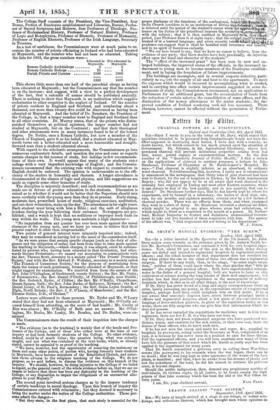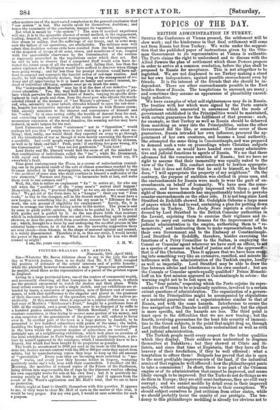IRA HUE AGAINST "THE SYSTEM." Bayswater, 11th April 1855. Son—We
have at length arrived at a stage in our doings, or rather mis- doings, and reflections thereon, which has brought men whose opinions in other matters are of the most varied complexion to the general conclusion that "our system" is bad. The results speak for themselves, doubtless; and hence the unanimity of the conclusion, maugre its vagueness. But what is meant by "the system" ? The man of nautical experience will say, it is to the miserable absence of sound method, in the engagement, loading, despatch, and subsequent management, and use of transports, whe- ther steam or sailing, that the sufferings of our troops, and in some mea- sure the failure of our operations, are attributable. The military man will admit that doubtless serious evils have resulted from the bad management of the despatch of troops of all arms, stores, and munitions of war, coupled with the unavoidable observance by the Commissariat of the routine so rigorously prescribed in the regulations under which they act. But he will be sure to observe that a competent Staff would soon have de- tected the latent cause of all the mischief; and, failing that, less than the active vigilance of a Wellington would have sufficed to discover when things were going wrong ; and far less than his prompt decision would have suf- ficed to suspend and supersede the baneful action of red-tape routine. And finally, he will emphatically declare, that as long as the management of mu:
Army and all appertaining to it is based on family and monk interest, in- stead of individual efficiency, matters must go on much the same. The "independent Member " may lay it at the door of our defective "na- tional education." You, Sir, may hold that it is the inherent spirit of job- bery which pervades the national heart of hearts, varying its specific deve- lopment in each grade and class, from the ducal peer who obtains the much- coveted riband at the instance of "her Majesty's advisers," to the humble cad, who, ostensibly in your behalf, obtrudes himself to open the cab-door : he, humble but instinctive imitator of his superiors in both Houses assem- bled, adroitly ministers to the interest and convenience of himself and his "order," by at once saving cabby the trouble of descent from his seat, and extracting such current coin of the realm from your pocket, as, in a momentary expansion of the mood donative, the seeming service may have induced, in meet largess for his zeal. Lord Palmerston and other " statesmen" not in " Opposition" would perhaps tell you that " people were in fact making a great ado about no- thing ; that, really, one would think they expected an army to go through all the vicissitudes of war as though it were merely executing the figures of a quadrille. And could people expect that men should not fall by sickness, as well as by blade and ball ? Pooh, pooh ! if anything has gone wrong, it's the Commissariat " ; and " they are not gentlemen." Voila tout !
Lord Derby and Mr. Disraeli would find the cause of all the mischief in that combinatian of individuals called the " ins" ; while Mr. Drummond, with equal and characteristic lucidity and discrimination, would say, it's everybody's fault.
Your great contemporary the Times, in a course of ratiocination remind- ing one in its practical result of the sort of climax sometimes reached by the German intellect in high investigations, sets us down comfortably to wait " the accident of some man who shall combine in himself a sufficiency of the two elements," Norman and Saxon, " to harmonize both at last, and make them work to one common end" !
Well, Sir, this is rather an unpleasant " fix" to arrive at; for who can tell when the " accident" of the " some man's" arrival shall happen ? Meanwhile, shall we, " practical English" as we are, sit down content with this ? We got rid of the Corn-laws by a "League" : their cry was " Free trade," to buy in the cheapest, sell in the dearest market. We must have a new League, or something like it ; and the cry must be " Efficiency for the work, the sole ground of eligibility for employment." Surely, Sir,. it is time to arrange our ideas for taking action in the matter. The press is said by some to guide public opinion, by others to be guided by it. I believe it i
both guides and is guided by it. As the sun draws forth that moisture which in exhalations ascends from sea and river, descending again in genial showers, so does the press elicit from countless sources fact and crude opin- ion ; which, brought to a focus by and undergoing the needful process in the editorial brain—where, be it far from me the unworthy supposition there are ever clouds—from whence, in the shape of matured opinion and counsel, it is widely disseminated. Therefore it is, in this our strait, I would invoke the power of the press to aid us. What meed too high for him who shall counsel us aright ?
I am, Sir, yours very respectfully, I. H. W.



























 Previous page
Previous page